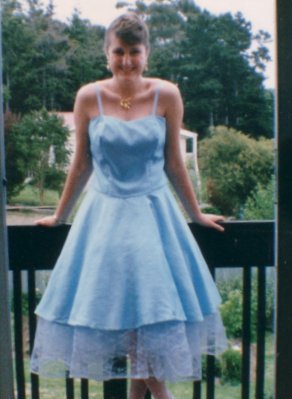”If you're girly I'll make you braid my hair and listen to me talk about boys, which believe me I can do for a really long time.”
I wrote that at Bardic Web this week, and it annoyed the hell out of me. Don’t worry: even with context it’d be pretty much impossible to work out why. Basically it comes down to this: language is usually my bitch, so when I can’t make it roll over and do what I want it to, I get cranky. I get especially cranky when the problem is that colloquial English doesn’t work well for bisexuals.
Let me take you on a journey of WTF-scovery. The quote above comes from my favourite character, my best girl Ghet. She’s talking to a friend of hers, Shadow, who is written by another writer. The way we work, as a cross between writing and role-playing, means that we have to be more precise than we might otherwise be in what our characters do and say, so that the other writers don’t get confused. So I have to convey Ghet’s meaning to Shadow’s writer, as well as to other readers.
The problem with the sentence is that, if there was any other option, Ghet wouldn’t say it. She’s bisexual: there’s no reason she’d only want to talk about boys. She’s actually come to Shadow to tell her that she’s starting boffing one of the other women in their party.
Now, if Ghet’s talking about just one gender:
Tall, lean, fit, young, and obviously bright, it was no wonder he’d got into trouble teaching at the Academy. Back in her day, Ghet would have eaten him alive, or at least given him a serious licking.
or the other:
"Mira does not look like you. She's much hotter. Sometimes I regret there's not enough of me to go around; I'd have done your daughter like a dinner. And I eat with my hands."
that’s fine. I’ve never had trouble expressing that when Ghet is talking about a girl, it might be rude. But when it comes to generalisations… you can talk about boys in general, or girls in general, and clearly convey sexual connotation, but as soon as you use the word ‘people’ the implied meaning of the sentence changes completely.
Going back to our original sentence, “talk about boys” clearly means “talk about males that I fancy in a sexual context”. But if I change it to a more accurate “talk about people”, suddenly the implication is gossip: the sexual connotation vanishes completely. I could say ‘lovers’ but that’s not what I mean either: many of the people under discussion wouldn’t be people she’d slept with. (Yet.)
Writing Ghet, I fall over this problem often enough that it really bothers me. I can’t seem to find any smooth, natural way to convey a bisexual interest so that my fellow writers clearly understand what I mean. Compare the connotation of “I’ve known a lot of men in my time” and “I’ve known a lot of people”.
Usually when I have a writing problem like this I try to find out what other writers do in this situation. Alright, I ask myself, What Would Joss Do? Trouble is, there are no bisexuals. (Please note: this is a link to TV Tropes. If you haven't been there before, you're at work, or short on time, please finish the column before following the link. You won't be back for hours.)
Well, there’s one. One writer, one show, one stand-out ‘shag anything if it’s gorgeous enough’ character. Now, I don’t want anyone thinking I’m a big girl’s blouse who gets all hysterically over-emotional, but when I first saw Captain Jack Harkness in Doctor Who, I cried. Thanks to the blog age, I can actually go back and see what I thought at the time. (Yes, a large portion of this column is recycled quotations, but at least I’m only plagiarising myself.)
But the most important thing about Captain Jack for me is that he's bi. There is no way I can convey to a straight white able-bodied Christian what's it's like to never see yourself depicted on television. To not exist. It's like the way right-handed people never notice all the little things about the way the world is set up that make life difficult for left-handed people. It's not prejudice, it's just a blind spot.
The step after not being depicted at all is stereotyping. Gays are stereotyped as camp, we've all seen that. Bis are stereotyped as promiscuous on the very rare occasions that you do see them. Yeah, I'd like to see a day when a character just happens to be bi and it's present but not a big deal. The closest I can come to that is, say, the Jewish characters in the West Wing. You know they're Jewish, but it's not constantly right there in your face, they're not wearing a 'hello I'm Jewish' badge, and they're all different people, different characters.
However, in the meantime, I have to say I rush on seeing Captain Jack.
All of which seems to mean I should be stalking Russell T. Davies.
Except it’s not really his problem. Davies is gay. John Barrowman is gay. Between them they’ve already given us a fabulous role model. I’m the one who’s bisexual. I’m the one whose People language is failing. There must be a way around this. I’m open to suggestions. (Of course I am, you know what those bloody bisexuals are like.)


